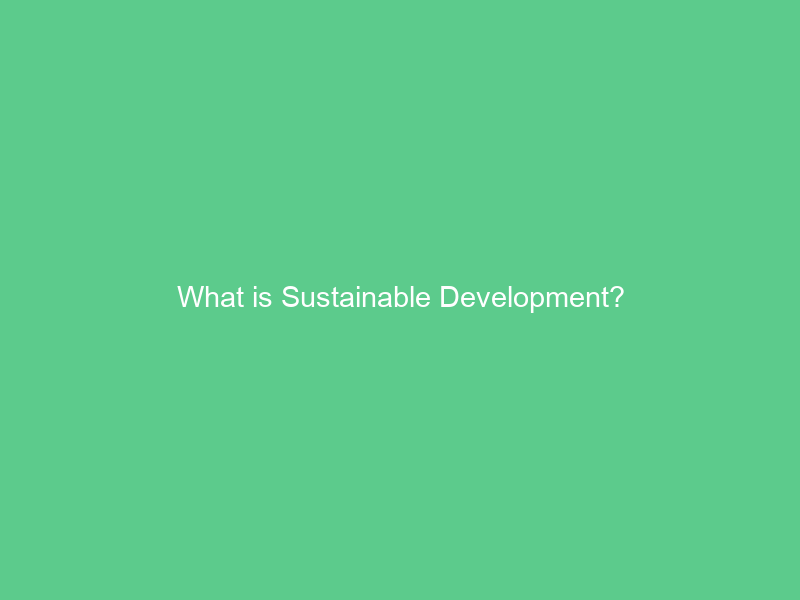Sustainable development refers to any approach that allows future generations to meet their own needs, without endangering economic, social or environmental sustainability. This encompasses economic, social and environmental aspects.
Environmental sustainability involves ensuring that resource extraction does not surpass resource recoupment rates and that waste generation falls within the capacity of the environment. Population control may also be required.
Environment
Sustainable development seeks to achieve balance among economic growth, social equity and environmental protection. Furthermore, sustainable development promotes efficient usage of natural resources so as to guarantee their continued availability for future use.
Environment-friendly practices such as recycling and waste reduction are crucial components of sustainability. By helping prevent pollution and preserve biodiversity, as well as decreasing water consumption and energy costs. Additional ways of supporting sustainability include employing green building practices like installing energy-saving appliances or water-conserving fixtures into buildings.
Another key aspect of sustainability is preserving ecosystems, which provide services such as pollination, fertile soils and regulation of climate systems. Ecosystems must be preserved to meet rising demands on their services; similarly sustainable development encourages responsible consumption and production practices as well as providing affordable clean energy supplies – this ensures everyone has access to quality healthcare, education and employment opportunities.
Human health
The 17 Sustainable Development Goals (SDGs) cover an expansive set of issues, from eliminating poverty and hunger to environmental degradation and sustainable financing. More comprehensive than their predecessor, the eight Millennium Development Goals that expired in 2015, the SDGs seek to enhance humanity’s wellbeing on a long-term basis.
Human health is inextricably tied to sustainable development. Unsustainable practices have resulted in climate change, biodiversity loss, zoonotic diseases and rising healthcare costs which threaten future generations’ wellbeing and their own.
One approach that can effectively address global challenges holistically is the “One Health approach”, which recognizes that humans, animals, and ecosystems all interact to form one integrated whole. HPH promotes this approach through research and education to support sustainable land stewardship practices that build thriving ecosystems while decreasing zoonotic diseases burden and increasing human connection with nature.
Economic growth
Economic development is integral to creating a thriving, healthy planet, but sustainable economic development must be accomplished using ecologically sound practices in order to reduce environmental damage and ensure social inclusion. Achieving sustainable economic development involves encouraging fair trade practices, sustainable consumption patterns and resource efficiency while investing in renewable energy technologies, supporting entrepreneurship and innovation projects and addressing economic inequality issues.
Emerging economies that experience high rates of economic growth promote inclusion by creating meaningful jobs and increasing household market incomes, helping reduce global poverty levels by two thirds while welcoming hundreds of millions into middle class status.
Sustainable Development Goals (SDGs) require investments of between $5-7 trillion; current investment levels fall far short of this threshold. Furthermore, wealthy countries often score highly on the SDGs despite having large consumption footprints; this increases the risk that economic activities are not aligned with ecological sustainability objectives. Richer data and more stringent analytical methods should be employed to accurately assess how economic-production and consumption activities may have an effect on environmental issues.
Social development
The social dimension of sustainable development seeks to promote equal rights and opportunities for all, such as providing high-quality education and lifelong learning programs for all. Furthermore, this dimension addresses inequality issues such as child mortality reduction while creating global partnerships.
At once an enormous challenge and opportunity, progress has been made towards social sustainability. Since 2000, deaths among children under five have decreased 47% globally. Another key element for sustainable societies is making sure all individuals have access to safe water sources and sanitation facilities.
Business must consider their social impact and sustainability, especially as consumers become more concerned with environmental and social impacts of products they purchase, with many willing to spend more for ethically produced items. As a result, more companies are teaming up with organizations that aid transparency within their supply chains as well as understanding human cost implications of operations as they focus on creating corporate social responsibility programs for themselves.

